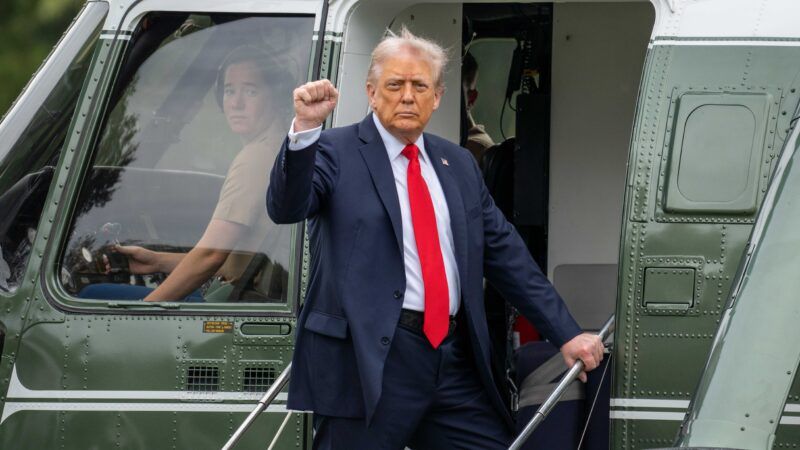Another Military Strike on a Speedboat Confirms Trump's Policy of Murdering Suspected Drug Smugglers
The president's new approach to drug law enforcement represents a stark departure from military norms and criminal justice principles.

After President Donald Trump ordered a drone strike that killed 11 alleged drug smugglers on a speedboat in the Caribbean Sea on September 2, Secretary of State Marco Rubio said the attack signaled a new approach to drug law enforcement. "Instead of interdicting it, on the president's orders, we blew it up—and it'll happen again," Rubio told reporters.
It happened again on Monday, when U.S. forces blew up another speedboat in the Caribbean, killing three people whom Trump described as "confirmed narcoterrorists from Venezuela." Although Trump frames his unprecedented use of the U.S. military to summarily execute drug suspects as "self-defense," it plainly does not fit that description. By his own account, he has unilaterally decided to impose the death penalty on alleged drug traffickers for the sake of deterrence. That policy represents a stark departure from both military norms and criminal justice principles.
As Georgetown law professor Marty Lederman noted after the September 2 drone strike, the Department of Defense previously adhered to the principle that "the military must not use lethal force against civilians, even if they are alleged, or even known, to be violating the law." Lederman added that "it's difficult to understand how it came to pass that the non-appointed military officials and enlistees involved in the operation assented to such an indefensible breach of the fundamental norm against targeting civilians."
The Trump administration "has not even seriously tried to present a legal argument to justify the premeditated killing of the people aboard these two vessels," former State Department lawyer Brian Finucane told The New York Times. "The U.S. president does not have a license to kill suspected drug smugglers on that basis alone."
Rear Adm. Donald J. Guter, who served as the Navy's top judge advocate general from 2000 to 2002, concurred. "Trump is normalizing what I consider to be an unlawful strike," he said.
In a letter to Congress after the first boat attack, Trump said he was exercising his "constitutional authority as Commander in Chief and Chief Executive" to protect U.S. "national security and foreign policy interests." Drug cartels have "wrought devastating consequences on American communities for decades, causing the deaths of tens of thousands of United States citizens each year and threatening our national security and foreign policy interests both at home and abroad," he wrote. "We have now reached a critical point where we must meet this threat to our citizens and our most vital national interests with United States military force in self-defense."
Despite that framing, Trump does not claim the men whose deaths he ordered were engaged in literal attacks on the United States. The justification in both cases was that the targets were "transporting illegal narcotics," which Trump dubiously equates with violent aggression.
Sebastian Gorka, Trump's top counterterrorism adviser, echoed that conflation in a recent Newsmax interview. "This is a war," he said, and "the cartel started it." Drug traffickers "are an exigent threat to the United States" because they are "killing Americans in mass numbers," he explained, so "we will take the fight" to them.
Anyone who questions the justice of criminalizing consensual transactions among adults will have trouble accepting the premise that selling drugs is morally equivalent to homicide. And critics of prohibition would be quick to note all the ways in which that policy makes drug use more dangerous, contributing to the deaths that Trump claims he is trying to prevent. In any case, drug trafficking is not ordinarily punishable by death, even with the due process that Trump decided these alleged smugglers did not deserve.
"Killing cartel members who poison our fellow citizens is the highest and best use of our military," Vice President J.D. Vance declared in an X post on September 6. "What a despicable and thoughtless sentiment it is to glorify killing someone without a trial," Sen. Rand Paul (R–Ky.) responded.
Trump has no patience with such legal niceties because he is intent on sending a message to drug traffickers. "Please let this serve as notice to anybody even thinking about bringing drugs into the United States of America," he said on Truth Social after the first attack. "BEWARE!" He reiterated that rationale on Monday: "BE WARNED — IF YOU ARE TRANSPORTING DRUGS THAT CAN KILL AMERICANS, WE ARE HUNTING YOU!"
Trump's bloodthirstiness is not surprising given his frequently expressed support for executing drug dealers. Now he has taken that policy preference a step further, dispensing with the need for statutes that authorize the death penalty, criminal charges, and trials where the government has to prove its case.
During his first term, Trump repeatedly praised Philippine President Rodrigo Duterte, a brutal drug warrior who likened himself to Adolf Hitler while urging the murder of drug offenders. Trump bragged of his "great relationship" with Duterte, who he said was doing "a great job" in tackling substance abuse. Now Trump seems bent on copying his example.


Show Comments (164)